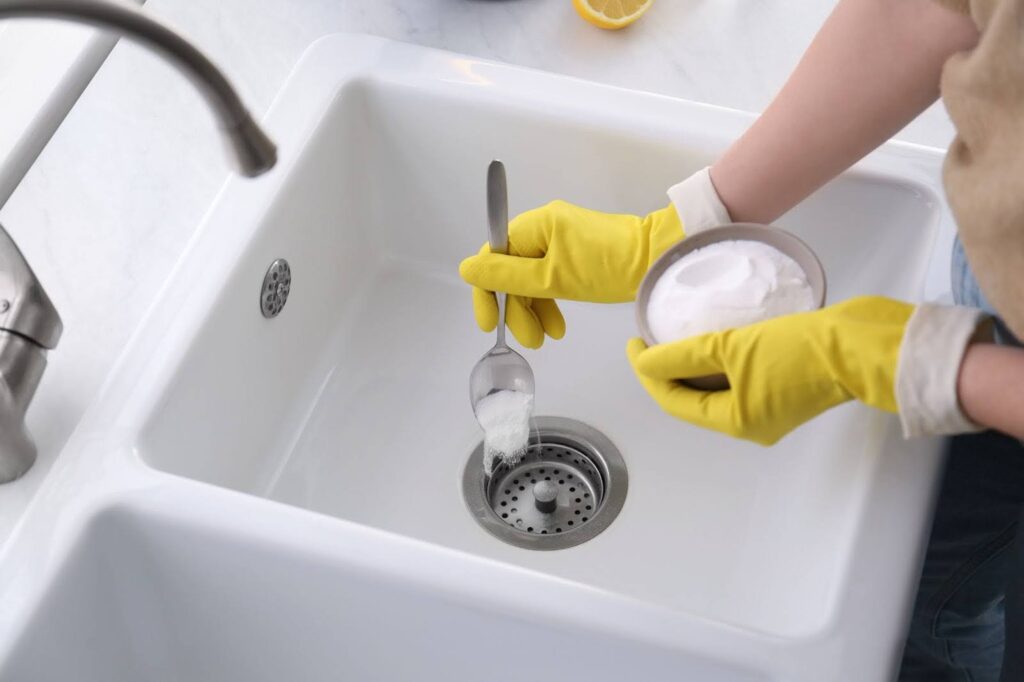A clogged drain can bring your whole day to a halt. And that backed-up kitchen sink, slow-draining shower, or toilet that refuses to flush might be more than just an inconvenience — they could be causing real damage to your plumbing system and home. Fortunately, there’s a way to stay ahead of clogs forming in the first place.
As drain cleaning experts in Santa Fe, NM, we believe a little prevention goes a long way. Below, we’ll walk you through easy, effective habits to prevent drain clogs and keep things flowing smoothly in every corner of your home!
Be Mindful of What Goes Down the Drain
The first step in preventing clogs is controlling what enters your drains. In the kitchen, avoid pouring oil, grease, or fat down the sink, even if it’s in liquid form. These substances cool and solidify inside your pipes, creating blockages that trap food particles, soap scum, and other debris. Instead, collect cooking oil and grease in a container and toss it in the garbage or take it to a local recycling center.
Don’t treat your garbage disposal like a trash can either. Coffee grounds, rice, and fibrous vegetables like celery or onion skins may seem harmless, but they can build up in your drainage system. A mesh sink strainer or catcher can help trap food waste before it has a chance to cause trouble.
In the bathroom, avoid flushing anything besides toilet paper and human waste. Cotton swabs, paper towels, feminine hygiene products, dental floss, and wipes (yes, even the ones labeled “flushable”) can all get caught in your plumbing or clog the sanitary sewer. These items don’t break down like toilet paper and often result in stubborn backups.
Develop Healthy Plumbing Habits
Good habits are your first line of defense against clogs. Make it a point to clean hair and soap residue out of your shower, bathtub, and bathroom sink drains regularly. A simple hair catcher in your shower drain can save you from having to reach for a snake or plunger down the line.
Use a stopper to block debris from going down the drain while shaving or brushing your hair, and never wash large clumps of dirt or clay from shoes or clothes in the sink or bathtub. These particles can settle and harden inside your pipes like concrete.
After washing dishes or rinsing off in the shower, running hot tap water for a few extra seconds can help push oils and soap residue through the trap and into the main sewage line, rather than letting them build up near the opening.
Use Natural Cleaning Agents Monthly
Chemical drain cleaners may be effective in a pinch, but regular use can corrode your pipes, especially in older homes with metal plumbing. A safer, more environmentally friendly option is to use natural cleaning agents to maintain your drains.
Once a month, try pouring a mixture of vinegar and sodium bicarbonate (baking soda) down each drain. This chemical reaction creates a fizzing action that can help loosen grease, soap scum, and other organic matter. Follow it up with boiling water to flush out loosened debris. This method works well in the kitchen, bathroom, and even in your basement utility sinks.
Don’t Forget About Outdoor and Hidden Drains
Clogs don’t only happen in your kitchen or bathroom; they can also start outside or in unseen parts of your home. Leaves, twigs, and dirt can block yard drains, while tree root intrusion can cause major blockages in your main sewer line. If you have large trees on your property, regular plumbing inspections may help you detect root issues before they lead to a major sewage headache.
Also, be sure to inspect your sump pump if you have one in your basement. It plays a crucial role in keeping your drainage system running during heavy rains or floods. A malfunctioning pump can allow water and waste to back up into your home, damaging walls, floors, and foundations.
If you notice foul odors near your drains, gurgling sounds, or slow water drainage, these may be signs of a deeper plumbing issue. Don’t ignore them — a timely check by a professional could prevent costly repairs.
Know When to Call the Pros
While DIY tools like a snake or plunger can often help with minor blockages, some clogs are stubborn, recurring, or caused by deeper issues like pipe corrosion or a poor drainage design. A licensed plumber can inspect your system, clear difficult clogs, perform necessary drain repairs, and help you avoid future plumbing failures with professional maintenance solutions.
Investing in routine plumbing maintenance not only helps prevent clogs — it also protects your home’s value and keeps your daily hygiene habits, from brushing your teeth to baking in a clean kitchen, running without a hitch.
Clogged Drain? Call Our Crew!
Clogs don’t have to be a constant headache. By adopting smart habits like using a sink strainer, disposing of grease and food waste properly, and avoiding flushing paper towels or feminine hygiene products in toilets, you can keep your drainage system running smoothly.
When stubborn blockages or deeper plumbing issues do appear, know Roadrunner is here for you. Call our trusted professionals, and we’ll restore your peace of mind with expert plumbing services in Santa Fe, NM!

